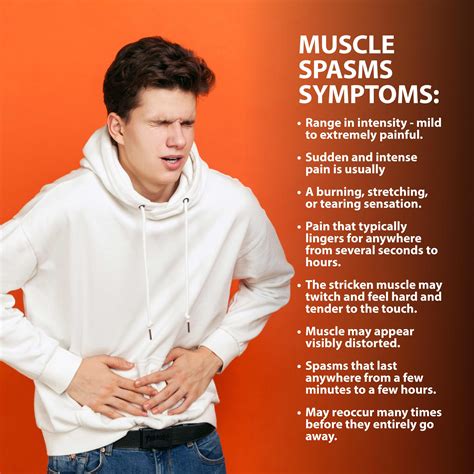Muscle Spasms Overview | Causes, Symptoms, Treatment
Muscle Spasms FAQ
What does a muscle spasm feel like?
Neurological health conditions affect the brain or spinal cord, which is responsible for making the muscles move. Not all muscle spasms are painful, but some can be. It can feel like the muscle is jumping or moving on its own, with this feeling typically lasting just a few seconds. Some people might even be able to see the muscle twitching.
What should I do if I have muscle spasms?
Gently stretching or massaging the affected area or using a heat or ice pack may help. Sometimes, muscle spasms can be a sign of an underlying health condition. Anyone with frequent or severe muscle spasms should speak to a doctor. Read this article in Spanish.
Where do muscle spasms occur?
They can also occur in the abdomen or along the rib cage. Muscle spasms are typically harmless, but they may result in an inability to use the affected muscle for a short period of time. What causes muscle spasms?
What are muscle spasms & cramps?
Most muscle spasms and cramps are involuntary contractions of a muscle. A serious muscle spasm doesn't release on its own and requires manual stretching to help relax and lengthen the shortened muscle. Cramps can involve part of a muscle or all the muscles in a group. The most commonly affected muscle groups include:
What are muscle spasms?
Muscle spasms are common, involuntary contractions of a muscle that can cause stiffness and tightening. Any muscle can spasm, and spasms may occur in part or all of the muscle, or even in a group of muscles. Muscle spasms (also called spasticity) can be mild or severe.
What are the different types of muscle spasms?
Some of the most common types include: Back spasms. Arm spasms. Leg cramps and charley horses. Neck spasms. Chest cramps. Abdomen cramps. Ribcage spasms. Cleveland Clinic is a non-profit academic medical center. Advertising on our site helps support our mission. We do not endorse non-Cleveland Clinic products or services. Policy
Are muscle spasms normal?
Muscle spasms (also called muscle cramps) occur when your muscle involuntarily and forcibly contracts uncontrollably and can’t relax. Muscle spasms are normal and quite common. They can involve part or all of a muscle or several muscles in a group. You can get muscle spasms anywhere in your body. Some of the most common types include: Back spasms.
Muscle Spasms References
If you want to know more about Muscle Spasms, consider exploring links below:
What Is Muscle Spasms
- https://www.medicalnewstoday.com/articles/muscle-spasms
- https://www.nhs.uk/conditions/dystonia/
- https://my.clevelandclinic.org/health/diseases/muscle-spasms-muscle-cramps
- https://www.mayoclinic.org/diseases-conditions/muscle-cramp/symptoms-causes/syc-20350820
- https://www.medicinenet.com/muscle_spasms/article.htm
- https://www.osmosis.org/answers/muscle-spasms
- https://www.webmd.com/brain/ss/slideshow-twitches-spasms-causes
- https://www.verywellhealth.com/what-causes-muscle-spasms-and-cramps-3120487
Muscle Spasms Information
Explore Related Topics
Chiropractic Care: An Alternative Route to Diabetic Neuropathy Relief
Consider chiropractic care as a viable alternative route to finding relief from diabetic neuropathy.
